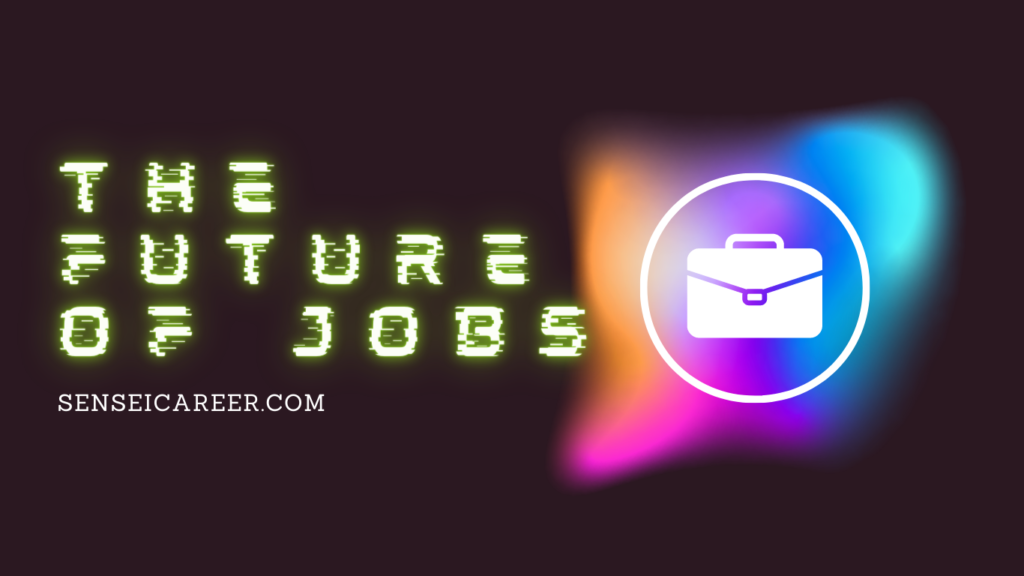
It’s the third decade of the 21st century: an era where industries and the work landscape evolve at an unprecedented pace. The shift has a colossal impact on the future of careers.
The endless yearning to automate almost everything led us to a turning point where we couldn’t choose any direction but up. Along with this desire comes more ambitious inventions, which made a few of us think, are we going too far?
But just as we thought that we were getting close to stasis, the tech revolution revealed that we’ve just scratched the surface. Amidst the worries of a massive tech takeover, this is indeed a productive era for humanity.
Accelerated by technology, globalization, societal changes, and, more recently, the global pandemic, new careers are emerging while traditional ones are being reshaped or made obsolete.
Still, experts expect more transformations to come as we forcefully develop today’s tech in a bid to outgrow our competition.
This collection of research, findings, and insights of SenseiCareer.com delves deeper into the future of work while exploring the emerging careers and trends set to define it.
The Rise of the Digital Economy

The digital economy has long ceased to be a segment of the larger economy. With the internet permeating every corner of our lives, careers in technology, from software development to cybersecurity, describing it as an emerging system is an understatement.
However, the tech landscape is not the only sector where the digital revolution landed immense impacts. Traditional industries such as finance, healthcare, education, and media have undergone digital modification and are still creating a demand for roles that haven’t existed for years. Listed below are some of the careers that will remain strong in the digital economy.
Content Creators
Content creators have been around for some time. Yet, as knowledge becomes more valuable while the digital economy progresses, so does the importance of original and high-quality material. As the digital marketing firm DigiSenpai would say, “The future is content.”
It may be a short attempt to say something so big, but it is just one of the truest things to convey as of this time. With human-generated junk and AI trash circulating the digital stream, more content heroes need to enter the arena to maintain a healthy, sensible, and factual exchange of information.
The same company specializing in Search Engine Optimization (SEO) also predicted that despite the AI intervention, search engine authorities would find a way to identify those who abuse these tools to fill their black-hat websites and penalize them. As such, the digital progress blueprint will annihilate those who attempt to manipulate the search engine result pages and award those who pay more respect to higher quality content.
Digital Marketers
As businesses increasingly move online, professionals specializing in SEO, Search Engine Marketing (SEM), display ads, content marketing, social media, email outreach, and other forms of digital marketing are in high demand. However, everyone must take note of the kind of digital marketer they should hire.
As mentioned in the previous section, websites with crass quality built on black-hat efforts are penalized. This originated from shady digital marketers that focused on the manipulation of search results through spammy tricks instead of organic approaches and creating value-adding, highly relevant content. Thus, the future will only welcome white-hat digital marketers, given the intense crackdown on spam and low-quality content.
Data Scientists
Data scientists collect, analyze, and interpret large and complex datasets assisting companies in crucial decision-making. In an increasingly data-driven world, companies that can massively collect, process, interpret, and utilize data for different purposes have the power to outshine their competitors and dominate the market.
For a more technical explication, businesses across all industries recognize the value of data. Thus, they are shifting toward data-driven decision-making instead of traditional tabulation. Whether it’s predicting customer behavior, optimizing supply chains, or identifying growth opportunities, corporations need data scientists to turn the data they collect into actionable insights.
UX Designers
User Experience (UX) Designers hold a key role in developing user-friendly, intuitive, and enjoyable experiences for digital products and services. The future of work will likely witness a significant expansion in the demand for UX Designer careers, with several key factors contributing to this trend.
The ongoing digital transformation across businesses and industries worldwide intensifies the need for UX Designers. They are essential in crafting seamless and intuitive digital interfaces and experiences for apps, websites, or various software. In the landscape of digital products, a well-executed user experience can be the differentiating factor between a product’s success or failure.
Also, consumer expectations have escalated in the digital age. Today’s users demand more than mere functionality from their digital experiences. They seek out automatic, easy to navigate, and aesthetically pleasing products. The role of UX Designers is crucial in fulfilling these elevated user anticipations and creating products that captivate and delight users.
Another factor influencing the rise in UX Designer roles is the pursuit of competitive advantage. In the saturated digital market, an exceptional user experience can offer companies a notable competitive edge.
Increasingly, businesses recognize the value of investing in UX design as a strategy to attract and retain customers, thus reducing the cost of customer acquisition and enhancing customer lifetime value.
UX Designers also have a significant influence on essential business metrics. Good UX design directly impacts user engagement, conversion rates, customer satisfaction, and retention rates. By fostering a positive user experience, UX Designers can effectively drive business growth and profitability.
Inclusive marketing also contributes to the rising importance of UX Designers. It’s now recognized that digital products must be accessible and considerate to all users, particularly individuals with disabilities.
The role of UX Designers is set to grow in importance as businesses from different industries compete against each other to win user expectations. These players also strive to improve competitiveness and harness new technologies with the help of these experts.
E-Learning Specialists
E-Learning Specialists, professionals who design, implement, and optimize electronic learning programs, are poised to become increasingly sought-after in the near future. This shift is largely fueled by the widespread transition to online learning, a trend accelerated by the COVID-19 pandemic. Apart from highly-recommended online business courses, other programs of study, like law, nursing, engineering, and healthcare leadership, are now available online.
Schools, universities, and workplaces have had to adapt to remote learning methods, and many plan to maintain these strategies even post-pandemic. This creates a sustainable demand for experts in the e-learning field.
The integration of budding technologies such as Artificial Intelligence (AI), Virtual Reality (VR), and Augmented Reality (AR) into education is also driving demand for E-Learning Specialists. The educational landscape is rapidly changing, and professionals who can harness these technologies to enrich learning experiences are becoming invaluable. In addition to this, the rising emphasis on continuous learning and development in the corporate world necessitates e-learning experts. These specialists can tailor easily accessible training programs, making them integral to corporate training initiatives.
E-learning also has a cost-effective edge over traditional education methods. It requires fewer resources and removes costs associated with physical learning spaces. The scalability of e-learning platforms enables educational institutions and businesses to expand their educational outreach efficiently. E-Learning Specialists are needed to manage and optimize these cost-effective, large-scale e-learning efforts.
Lastly, the potential for personalized learning experiences and learning analytics in e-learning underscores the importance of E-Learning Specialists. They can design adaptive learning paths and create personalized content, thereby enhancing learning outcomes. Additionally, data gathered from e-learning platforms can guide improvements in curriculum design, learning interventions, and learner assessment. In conclusion, the rise of the digital economy, the evolution of technology, and the shifting landscape of education and corporate training are generating an increased need for E-Learning Specialists. These professionals will be pivotal in leveraging technology to create engaging, effective, and inclusive learning experiences.
Future of Careers: AI and Automation

Artificial Intelligence (AI) and automation are twin forces driving a seismic shift in the job landscape. While fears about job losses due to automation are valid to some extent, these technologies also usher in a wave of new roles. SenseiCareer predicts an unstoppable increase in the demand for AI specialists, robotics engineers, and automation consultants.
Moreover, the need for human-machine collaboration will rise as machines become more integrated into our work. After a few years of refinement, interaction with machines may be as breezy as talking to someone like Jarvis. This collaboration will necessitate professionals who can understand and communicate between humans and machines, creating roles like the below:
AI Ethicists
AI Ethicists will become increasingly necessary as Artificial Intelligence (AI) continues to permeate numerous aspects of society. Artificial Intelligence has the potential to summon immense benefits, enhancing efficiency and productivity across various sectors. However, its adoption also raises complex ethical issues that need to be thoughtfully addressed. Issues like bias in AI algorithms, privacy concerns, job displacement due to automation, and ensuring AI technologies are transparent and explainable are growing areas of concern that AI Ethicists are ideally positioned to tackle.
One significant issue lies in the potential for AI systems to perpetuate or even exacerbate societal biases. AI algorithms are trained on data, and if this data reflects societal biases, the AI system may also be biased. This can lead to discriminatory outcomes in areas such as hiring, lending, and law enforcement. AI Ethicists are needed to oversee the development and deployment of AI technologies, ensuring that they do not perpetuate harmful biases and work to mitigate any discriminatory outcomes.
AI Interaction Designers
Artificial Intelligence (AI) has become an increasingly pervasive aspect of our lives, with a surge in AI-powered applications. AI Interaction Designers, experts in designing intuitive and user-centric interfaces for AI systems, are crucial in this evolving landscape. These professionals need to understand AI technologies, as well as principles of usability and user experience, to create interfaces that foster meaningful interaction between the user and AI.
AI Interaction Designers are also critical in “humanizing” AI technology. As the interaction with AI often happens conversationally – as with voice assistants and chatbots – the user interface needs to feel natural, relatable, and intuitive. Designers must craft these conversational interfaces with a focus on dialogue design, personality traits, and error handling to ensure a smooth, positive user experience.
As AI technologies evolve and become more complex, the demand for skilled AI Interaction Designers will grow. These professionals are pivotal in making advanced technologies accessible and user-friendly, facilitating further adoption of AI. This need is even more pronounced as we venture into more sophisticated AI technologies, where effective interaction design can influence factors like safety, efficiency, and trust.
Machine Learning Transparency Analysts
The rapid technological advancements and the surge in data availability have spurred the need for Machine Learning Engineers. These professionals are crucial in developing and implementing algorithms that enable machines to learn, adapt, and make informed decisions. The increasing demand to harness machine learning across various industries for strategic decision-making, trend predictions, and operations streamlining is a driving force behind the rise of this role.
Machine Learning Engineers are also essential in the development and refinement of intricate AI systems, such as recommendation engines, natural language processing systems, and autonomous cars. These systems heavily depend on machine learning algorithms for optimal function, highlighting the need for professionals who can create, train, and optimize these models.
Finally, edge computing and the Internet of Things (IoT) present unexplored machine learning opportunities. As more devices become adept at collecting, interpreting, and processing data, there is a growing demand for machine learning models that can operate on different devices, enabling real-time decision-making and boosting efficiency. This futuristic transition will require a new generation of Machine Learning Engineers who can continuously innovate and adapt.
Sustainability and Green Jobs

As the world bears climate change, sustainability is becoming a major focus for governments and corporations. This emphasis on sustainability and clean energy drives a swell in “green jobs.”
Furthermore, as societies seek to build resilience against future environmental challenges, we will see increased roles focused on climate change adaptation and disaster risk reduction. From renewable energy technicians to sustainability consultants, these roles align with the global shift towards a more sustainable, green economy.
The imminent necessity to thwart the quick progress of climate change and transition from fossil fuels to eco-friendlier renewable energy sources is slowly becoming the default that would soon require the services of Renewable Energy Engineers. These professionals are key to this shift, specializing in current renewable energy technologies and discoveries of new energy sources. They focus on designing, implementing, optimizing, and maintaining these systems, contributing to international efforts that ultimately lessen greenhouse gas emissions.
Technological refinements and government policies are also significant drivers for the expansion of the renewable energy sector, subsequently heightening the demand for Renewable Energy Engineers.
As the efficiency and effectiveness of renewable energy technologies enhance, the costs associated with these energy sources are expected to decline. This cost-competitiveness surrounding fossil fuels forces the worldwide adoption of renewable energy systems.
With the escalating urgency for climate action and the favorable trends in the renewable energy sector, the role of a Renewable Energy Engineer is becoming increasingly vital. As we continue to prioritize and invest in sustainable energy solutions, these professionals are expected to play a huge role in structuring and implementing these technologies, making Renewable Energy Engineer a promising career path for the future.
Sustainability Consultant
The growing societal and regulatory pressures for businesses to adopt sustainable practices have given rise to a burgeoning need for Sustainability Consultants. These professionals offer specialized advice to businesses on how to reduce their environmental impact, achieve sustainability goals, and often improve their bottom line. Their role involves assessing a company’s operations, identifying areas for improvement, and recommending strategies for adopting more sustainable practices – all of which have become increasingly crucial in today’s corporate landscape.
One of the primary reasons for this growing demand is the evolving understanding that sustainability can offer significant business advantages. Consumers are increasingly favoring companies with strong sustainability credentials, while investors are more often considering environmental, social, and governance (ESG) entities in their investment decisions. Sustainability Consultants help businesses navigate these trends by identifying opportunities to integrate sustainability into their strategy, thereby enhancing their reputation and potentially driving competitive advantage.
Additionally, governments worldwide are introducing stricter regulations around environmental responsibility, making compliance a complex but essential task for businesses. Sustainability Consultants guide organizations through these regulatory landscapes, helping them adhere to environmental laws and standards, avoid penalties, and showcase their commitment to sustainability. As the global concern on sustainability intensifies, the demand for professionals who can offer this specialized expertise is set to increase, making Sustainability Consulting a significant career of the future.
Green Finance Advisor
The intersection of finance and sustainability has given rise to a new field known as green finance, which is dedicated to supporting investments in sustainable projects, businesses, and technologies. In this domain, Green Finance Advisors play a pivotal role. They give value-adding financial advice to corporations, governments, and private individuals on sustainable investment and other opportunities. Such expert insights help businesses secure funding for green initiatives and advise on risk management relating to environmental factors.
There is a growing recognition among investors that environmental, social, and governance (ESG) aspects can affect the financial performance and long-term viability of investments. With the mounting concern over climate change, shareholders divert more towards sustainable and responsible acquisitions. This paradigm shift in the financial landscape drives demand for Green Finance Advisors, who can help financers navigate the intricacies of green investments, manage probable risks, and capitalize on opportunities.
Additionally, governments worldwide are introducing policies to encourage green finance and sustainable business practices, creating an environment that favors the growth of green industries. These initiatives include tax incentives, grants, subsidies for sustainable projects, and stricter environmental regulations influencing business operations.
Green Finance Advisors are key in helping businesses and investors understand these policies, access funding, and ensure compliance. As the momentum towards sustainable finance continues, the role of Green Finance Advisors will only become more crucial, making it a prominent career path in the future.
Healthcare Innovation

Driven by an aging population, global health crisis, and technological advancements, the healthcare sector strives to constantly evolve. Beyond traditional roles like doctors and nurses, the future of careers points to digital health, genetic counseling, telemedicine, and health informatics.
Genomic Counselor
The breakthroughs in genomic medicine and the accessibility of genetic testing have resulted in the demand for Genomic Counselors. These professionals assume a critical role in making patients understand their genetic risks, interpreting test results, and making informed decisions about their health. They bridge the complex world of genomics and patients, providing vital information and aid throughout the genetic testing process.
Moreover, the surge in personalized medicine, an aspect where treatments are tailored to the genetic makeup of an individual, has greatly boosted the demand for Genomic Counselors. This behest will continue as more people seek genetic testing for their healthcare.
Lastly, the ethical, legal, and social implications of genetic testing amplify the need for Genomic Counselors. As the public navigate the new terrain of genetic information, issues surrounding privacy, discrimination, and psychological impacts come to the fore. Genomic Counselors the knowledge and tools to handle these situations, ensuring that individuals are fully aware and ready for the likely implications of genetic testing. As genomics continues to become an integral part of healthcare, so does the role of Genomic Counselors.
3D Bioprinting Specialist
The constantly evolving 3D printing technology in the biomedical field has called for more specialists. 3D Bioprinting professionals operate at the vanguard of regenerative medicine, developing biocompatible configurations for tissue engineering and organ transplants. The power of 3D bioprinting to create complex tissue structures and potential whole organs promises a significant breakthrough in healthcare, positioning these specialists as key contributors to future medical advancements.
As the global demand for organ transplants far exceeds supply, the potential to ‘print’ organs represents a transformative solution to a persistent challenge. Furthermore, 3D bioprinting can dramatically alter drug testing and disease modeling, allowing personalized medicine approaches based on an individual patient’s cell nature and composition. As the field advances, the need for experts adept at handling the complexities of 3D bioprinting will only grow, marking 3D Bioprinting specialists as a promising future career path.
The Gig Economy and Remote Careers

The gig economy, characterized by freelance, part-time, and temporary jobs, is another significant trend shaping the future of work. Workers are increasingly choosing flexibility over the traditional 9-to-5 routine, leading to careers built around remote work, digital nomadism, and portfolio careers.
This trend towards flexibility has been amplified by the global pandemic, causing a shift towards remote work on an unprecedented scale. As businesses adjust to this new reality, roles focused on managing and supporting remote workforces are becoming increasingly important.
Freelance Gig Platform Developers
The proliferation of the gig economy gave rise to a significant demand for Freelance Gig Platform Developers. These technical experts create and maintain online platforms that connect freelancers with potential clients. As more and more people are turning to freelance careers for flexibility, convenience, and independence, startups would run to developers to foster the concept of a better digital infrastructure that supports the gig economy and provide untapped services.
Additionally, the diversity within the gig economy, with freelancers spanning multiple industries and sectors, requires specialized gig platforms tailored to the unique needs of each profession. From writers and graphic designers to consultants and software developers, different fields have different project needs, payment structures, and workflow processes. Freelance Gig Platform Developers can address these nuances by creating industry-specific platforms that cater to the distinctive needs of different freelance sectors. As the gig economy expands and diversifies, the role of Freelance Gig Platform Developers will become increasingly significant.
Digital Nomad Advisor
The booming of remote work and digital technologies gave birth to the digital nomad lifestyle, where individuals exhaust technology to work remotely and enjoy a nomadic lifestyle. As this lifestyle becomes more prevalent, the need for Digital Nomad Advisors is increasing. These advisors provide guidance and support to digital nomads on various aspects, such as securing work visas, finding accommodation, managing finances across multiple currencies, and navigating international tax laws. They essentially handle the logistical challenges of a nomadic lifestyle, allowing digital nomads to focus on their work and travel.
Furthermore, each country has unique regulations and cultural nuances, making it challenging for digital nomads to navigate their lifestyles without professional assistance. Digital Nomad Advisors, equipped with expertise in international laws and cross-cultural skills, can offer invaluable support in these situations. As far places become increasingly interconnected and businesses continue to embrace remote work, the digital nomad lifestyle and, consequently, the demand for Digital Nomad Advisors is expected to grow significantly.
Top Skills Building The Future Of Careers
As the career landscape changes, so do the skills needed to navigate it. The World Economic Forum predicts that the following skills be crucial in the future job market.
Critical Thinking
In an increasingly complex, fast-paced, competitive, and unsure world, critical thinking skills will be crucial in the future job market. As automation and artificial intelligence take over repetitive tasks, the value of human employees will soon depend in their ability to think critically and to analyze information from various sources, discern underlying patterns, generate innovative solutions for complex problems, and make justitifed decisions despite uncertainties.
Furthermore, with the rapid gait of technological metamorphosis, the ability to learn and adapt – key components of critical thinking – will be paramount for staying relevant in the evolving job market. Thus, critical thinking will not only be a valuable edge but a basic necessity in the future of work.
Creativity
As automation and AI technologies continue to advance, tasks that are procedural and repetitive are increasingly being automated, shifting the value of human contribution towards unique human traits, like creativity. Creativity feeds innovation, problem-solving, and adaptation – abilities that are quintessentially human and cannot be imitated by machines.
The future of careers will put high leverage the capacity to generate unique ideas, formulate novel solutions to problems, and invent new products, services, or ways of doing things. With the rate of change revving in many enterprises, creative thinking will become an important asset for staying relevant and competitive.
Emotional Intelligence
As the future job market matures, Emotional Intelligence (EI) – the ability to understand, use, and manage one’s own emotions in positive ways to relieve stress, communicate efficiently, empathize with others, crush challenges, and de-escalate conflict – will remain unmatched. As automation takes over more technical, repetitive, and ordinary tasks, human roles will concentrate more on interpersonal relations, leadership, and collaboration, where EI is critical.
Moreover, in a globalized and diverse career world, the ability to empathize and band with individuals from varied backgrounds and cultures will be priceless. Thus, Emotional Intelligence will be a primary differentiator in the future job market, providing significant benefits in communication, relationship-building, leadership, and decision-making.
Complex Problem-Solving
The accelerating swiftness of technological metamorphosis and increasing global interconnectedness are making the future job market’s challenges more complex and intertwined than ever before. In this context, complex problem-solving — the power to understand how issues intertwine, determine root causes, and develop effective solutions — will be a highly-valued skill.
As automation and artificial intelligence take over simpler problem-solving tasks, human workers will be called upon more frequently to tackle complex, ambiguous problems that require a deep understanding of the problem context, creative thinking, and nuanced judgment. Consequently, individuals who excel in formulating solutions on high-ticket complexities will be highly sought after in the forthcoming job market.
Growth Mindset
Moreover, the ability to continuously learn and adapt—often referred to as a “growth mindset” or “learnability”—will be a key determinant of career success in the rapidly changing world of work.
Final Thoughts On The Future Of Careers
The future of careers, though marked by uncertainty, holds immense possibilities. As traditional career paths morph and new ones emerge, staying informed about these shifts and preparing is critical. While we cannot predict the future completely, knowing these trends will be helpful for individuals and organizations in navigating the evolving career topography with foresight and resilience. By doing so, humanity can turn the bottlenecks of the future of varying careers into opportunities for growth, innovation, and sustainable development.
